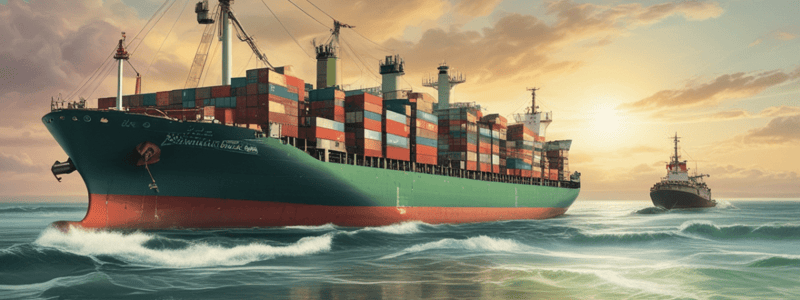Podcast
Questions and Answers
What is Ireland's unique selling point in international markets for food products?
What is Ireland's unique selling point in international markets for food products?
- Ancient Celtic culture and pollution-free image (correct)
- Low cost of production
- Diverse range of flavors offered
- Advanced technology in production
What is a key challenge Irish exporters face due to globalization?
What is a key challenge Irish exporters face due to globalization?
- Access to international markets
- Need for efficiency and research development (correct)
- Increased demand for Irish goods
- Lower production costs compared to global companies
How is the balance of payments calculated?
How is the balance of payments calculated?
- Total exports - total imports
- Balance of trade + balance of invisible trade (correct)
- Invisible exports - invisible imports
- Visible exports + visible imports
What happens when visible exports exceed visible imports?
What happens when visible exports exceed visible imports?
What is the impact of currency fluctuations on Irish exports?
What is the impact of currency fluctuations on Irish exports?
What constitutes a balance of invisible trade surplus?
What constitutes a balance of invisible trade surplus?
What defines visible exports?
What defines visible exports?
Why do Irish exporters need to adapt their products for new markets?
Why do Irish exporters need to adapt their products for new markets?
Which of the following statements about the World Trade Organization (WTO) is correct?
Which of the following statements about the World Trade Organization (WTO) is correct?
What would indicate a balance of trade deficit?
What would indicate a balance of trade deficit?
Flashcards are hidden until you start studying
Study Notes
Distribution Costs and Challenges
- High distribution costs for Irish exports due to Ireland's geographical position as an island at the edge of Europe.
- Irish firms must manage their costs effectively to maintain competitiveness against global companies.
- Global companies pose significant competition with high-quality products at competitive prices, necessitating efficiency improvements and R&D investments for Irish exporters.
- Language barriers complicate marketing efforts across the EU, which comprises 20 different languages affecting product names, packaging, and advertising.
Exchange Rate Fluctuations
- A stronger Euro increases the price of Irish products in non-Euro countries, potentially decreasing sales and profits.
- A weaker Euro raises costs for Irish businesses when importing materials from non-Euro countries.
Payment and Customs Challenges
- Difficulty in receiving payments for exports due to varying legal systems across countries, complicating debt recovery.
- Customs duties burden goods traded between EU and non-EU countries, raising export prices and reducing competitiveness.
Cultural and Trade Barriers
- Awareness of local customs and culture is essential for Irish firms to successfully market products abroad.
- Protectionism involves governments instituting trade barriers to defend home industries against foreign competition.
Protectionist Measures
- Tariffs: Taxes on imports that elevate their prices, making domestic products more attractive.
- Quotas: Limits on quantity of imports allowed over a specific period to favor domestic production.
- Embargoes: Bans on specific goods’ import/export due to political or health reasons.
- Subsidies: Financial aid provided to domestic companies to help lower their prices and maintain competitiveness.
- Administrative regulations: Increased red tape and customs procedures that delay imports, discouraging competition.
Trade Liberalization and Deregulation
- Deregulation lowers legal trade barriers, enhancing competition and benefiting consumers with lower prices.
- Trading blocs facilitate free trade, eliminating tariffs and reducing barriers among member countries. Types include:
- Free Trade Area: No tariffs or barriers among members (e.g., NAFTA).
- Customs Union: No tariffs among members and shared tariffs on non-members (e.g., EU).
- Common Market: Comprehensive economic integration allowing free trade of goods, services, capital, and labor.
Imports and Exports Overview
- Imports allow consumption of goods and services not available domestically, categorized as visible (physical goods) or invisible (services).
- Importing reasons include sourcing raw materials, unsuitable climate for production, and consumer variety.
- Visible exports entail the sale of physical goods to foreigners, while invisible exports involve services.
Challenges and Opportunities for Exporters
- Higher production costs in Ireland challenge exporters against international competitors.
- Growing markets in China and Japan present opportunities for Irish exporters, especially in food and drink.
- Advances in technology enhance marketing reach and communication, facilitating entry into international markets.
- Importance of adapting products to align with international customs and preferences.
Measuring International Trade
- Balance of Trade (BOT): Difference between visible exports and imports; a surplus indicates more exports, while a deficit indicates more imports.
- Balance of Invisible Trade (BOIT): Measures difference between invisible exports and imports; surplus reflects greater exports.
- Balance of Payments (BOP): Total money entering and leaving the country accounting for both visible and invisible trade, indicating overall trade health.
Studying That Suits You
Use AI to generate personalized quizzes and flashcards to suit your learning preferences.




